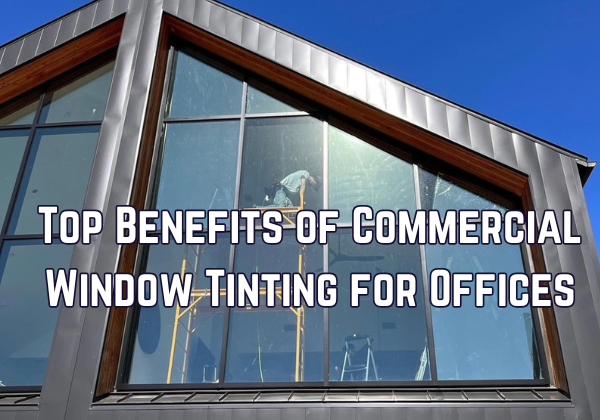If your office has lots of windows, you probably already deal with heat, glare, and high energy bills.
Commercial window tinting can solve these problems while also improving comfort, productivity, and building security.
In this guide, we’ll break down the most valuable benefits of tinting office windows, using real-world terms and practical info you can act on.
Key Takeaways
-
Commercial window tint helps lower energy bills by blocking solar heat.
-
It reduces glare on screens, improving employee productivity.
-
Window film enhances privacy without blocking natural light.
-
It protects furniture, flooring, and equipment from UV damage.
-
Tinted windows help improve the look and feel of your office space.
-
Certain films can strengthen glass and enhance security.
How Office Windows Impact the Work Environment
Office windows bring in natural light, but also bring problems when untreated:
| Problem | Impact |
|---|---|
| Heat gain from sunlight | Uncomfortable hot spots, overworked HVAC systems |
| Glare on screens | Eye strain, lower productivity, and frustrated employees |
| UV exposure | Fading on furniture, floors, and electronics |
| Lack of privacy | Distracting views in or out, especially in ground-level or glass offices |
| High energy bills | Extra cooling is needed during warm months |
Window film directly addresses each of these issues without replacing your glass.
1. Energy Efficiency and Cost Savings
Solar control window films block a significant portion of infrared (IR) rays, which are responsible for heat buildup.
By reducing solar heat gain, your HVAC system doesn’t have to work as hard, especially during summer afternoons.
Data-Backed Savings:
-
According to the U.S. Department of Energy, window films can reduce solar heat gain by up to 80%.
-
Offices with large glass surfaces can save up to 15% on annual cooling costs, depending on window orientation and film type.
-
Films with low solar heat gain coefficient (SHGC) values perform best for energy control.
Look for high-performance films rated by the NFRC (National Fenestration Rating Council) for accurate energy data.
2. Glare Reduction = Higher Productivity
Sun glare makes it hard to see screens and creates eye strain, especially for workers on computers all day.
Instead of closing blinds and working in the dark, window tint lets in natural daylight without harsh glare.
Film Benefits for Screen Visibility:
-
Reduces glare by 40–90%, depending on film type
-
Preserves outside views, so the office still feels open
-
Improves focus, comfort, and mood
Glare control is especially important in conference rooms, open-plan layouts, and corner offices with full-height glass.
3. Enhanced Privacy for Workspaces
Office tinting increases privacy without using frosted glass or blinds.
You can use:
-
Reflective window films to prevent people from seeing inside during the day
-
Frosted or decorative films for interior glass partitions or private offices
-
One-way privacy films for ground-level windows
This is especially helpful for healthcare offices, law firms, or financial services, where confidentiality matters.
Privacy films let in light while creating visual separation, ideal for modern glass-heavy office designs.
4. UV Protection for Interiors
UV rays (especially UVA) fade furniture, artwork, carpets, and even electronics over time.
Commercial-grade window films block up to 99.9% of UV rays, protecting your investment.
What UV Damage Looks Like:
-
Fading office furniture or branding materials
-
Cracking leather chairs or vinyl surfaces
-
Discoloration on wood, flooring, or reception counters
UV filtering is built into most modern window films, even the clear ones, so protection doesn’t always mean tinting everything dark.
5. Better Temperature Control and Comfort
Unbalanced temperatures in office spaces are a common complaint, especially near large windows or glass entryways.
Tinting evens out the temperature across the workspace, reducing cold and hot zones.
| Without Tint | With Commercial Tint |
|---|---|
| Overcooled or hot spots | More consistent indoor climate |
| Worker complaints | Fewer HVAC adjustments needed |
| High AC usage | Improved HVAC performance |
This leads to happier employees, fewer thermostat wars, and a more productive workplace.
6. Modern Appearance and Building Aesthetics
Tinted windows give office buildings a sleek, uniform exterior, which can improve curb appeal and perceived professionalism.
This matters for:
-
Corporate offices
-
Medical practices
-
Client-facing business spaces
Some films even provide daytime privacy with a mirrored finish, adding both function and style.
7. Safety and Security Benefits
Certain commercial films are made with polyester and adhesive layers that hold shattered glass together in case of breakage.
These safety and security films help:
-
Reduce injury from flying glass
-
Slow down forced entry or smash-and-grab attempts
-
Provide peace of mind during storms or vandalism events
Security films for offices provide comprehensive protection against break-ins and accidents. While not a substitute for alarms, they buy time and add a layer of protection to vulnerable glass surfaces.
Types of Commercial Window Film: Quick Comparison
| Film Type | Main Benefits | Best For |
|---|---|---|
| Ceramic Film | Clear, high heat and UV block, no reflectivity | Offices needing light + heat control |
| Reflective Film | Excellent glare and heat control, mirror look | Sun-facing or high-rise glass buildings |
| Frosted/Decorative Film | Privacy, branding, light diffusion | Glass conference rooms, private offices |
| Security Film | Shatter resistance, theft delay | Ground-floor windows, doors, and storefronts |
Summary: Why Commercial Window Tinting is a Smart Investment
Office window tinting offers more than just aesthetics, it improves comfort, productivity, energy efficiency, and interior protection. Professional installation ensures these benefits are delivered efficiently and with minimal disruption.
Here’s what you gain:
-
Lower utility costs from reduced heat
-
Better working conditions thanks to glare and temperature control
-
Enhanced security and privacy
-
Protection for furnishings and assets
-
A polished, modern building appearance
Tinting is a cost-effective solution with long-term value for almost any commercial space.



